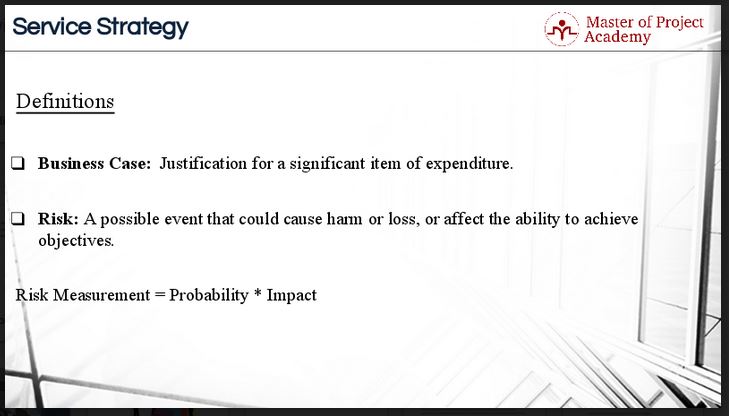If you’re an owner of an IT company or the head of an IT service provider division, there are some important ITIL definitions that you need to know by heart. The most important of these ITIL definitions are the ITIL definition for The Business Case and the ITIL foundation training definition for Risk. These ITIL definitions and the roles that business cases and risks play in IT service management are studied in ITIL courses for the ITIL foundation exam training.
In this article, we are going to give the explanations of these ITIL definitions and also illustrate these important ITIL definitions with some real life examples.

Business Case
In the ITIL definitions, it is indicated that a business case is a justification for a significant item of expenditure that will eventually result in revenue or some kind of benefit for the organization. For instance, if a competitor of your company published a new service acquiring young customers of the market, you will need to publish a similar service. This is the justification for creating this new service which will target the young customers of the market.
Let’s take another example from life. Let’s imagine that you are living in a small flat with your wife and one kid. You and your wife are awaiting a new baby, and when the baby comes, you will need a bigger flat. The need for more space to accommodate the baby is the business need on which your business case for spending money on moving to a new home is built.
IT service managers who are involved in the ITIL Service Strategy stage of the ITIL lifecycle for services must have sufficient knowledge of these ITIL definitions. It’s beneficial for contributing to the development of business cases for new IT services or the improvement of existing services. They must have a good idea of what their customers’ needs are, what the competitors are doing and how they can possibly deliver on those needs.

Risk
In the ITIL definitions, it is indicated that a risk is a possible event that could cause harm or loss, or affect the ability to achieve objectives. For instance, if there will be a flood in the region, data servers might be affected by the water. Or, if there will be an earthquake in the data center location of the company, there will be an outage time to recover services from backups. A risk is measured by the probability of a threat, the vulnerability of the asset to that threat and the impact it would have if it occurred.
Let’s consider the previously mentioned risks: floods and earthquakes. The actual impact of the two risks is same if these two risks happen. There will be an outage and it will take some time to recover services. However, if floods are more likely to happen compared to an earthquake, then flood risks are more important compared to earthquake risks because of its higher possibility to happen.

For effective IT service management, IT service managers and IT service owners must be well aware of the risks to which their services are vulnerable. They need to have contingency plans in place for the risks that are most likely to occur as well as detection tools for mitigating the risk via early intervention. If the possibility of the risk occurring can be spotted before it happens, then effective service management and risk avoidance were achieved.
Service Providers
In the ITIL definitions, there are different types of IT service providers and each type of service provider will have different business cases and risks. The ITIL library defines these three types of IT service providers:
ITIL definitions: Internal Service Provider
The first one is the internal service provider. As said in the ITIL definitions an internal service provider is part of the same organization as the customer. Imagine that IT department of the company stores the employee information in a database and human resources department of the same company uses services to get data of employees from this database. This type of relationship is an example of an internal service provider which can be found in ITIL definitions.
ITIL Definitions: Shared Service Unit
The second type of service provider is a shared service unit. In the ITIL definitions, it is defined that shared service unit provides services to departments from different business units. For instance, if an IT department provides services to the sales department, marketing department, logistic department, finance department etc. then this is an example of shared service unit which can be found in ITIL definitions.
ITIL Definitions: External Service Provider
The third and last type of service provider defined in the ITIL definitions is the external service provider. An external service provider provides its services to another organization. For instance, if a telecom operator is using the GPS service of another company to provide some special services to subscribers, this is an example of an external service provider which can be found in ITIL definitions.
It is critical for optimal IT service management that service managers and service owners know the ITIL definitions from the ITIL library that are relevant to their type of service provision. It is also very important that they know what types of risks are more likely to occur in their type of service provision. The impact of the same risk for an internal IT service provider is not necessarily the same as the impact for an external IT service provider and the risks must be managed according to their likelihood to happen and the extent of the damages that can be expected.
Similarly, the business cases that will drive innovation and revenue for internal service providers and external service providers will not be the same. Internal service providers and shared service units need to determine the unmet needs of the departments within their own company, while external service providers need to understand the needs of customers outside of their organization. The process of formulating a business case will be the same, but the burning platform on which the business case is built and justified will be different.
Knowing these ITIL definitions well is an important asset for IT service managers because when you know the definition, you would be more likely to manage the whole ITIL Process in a flawless way.
